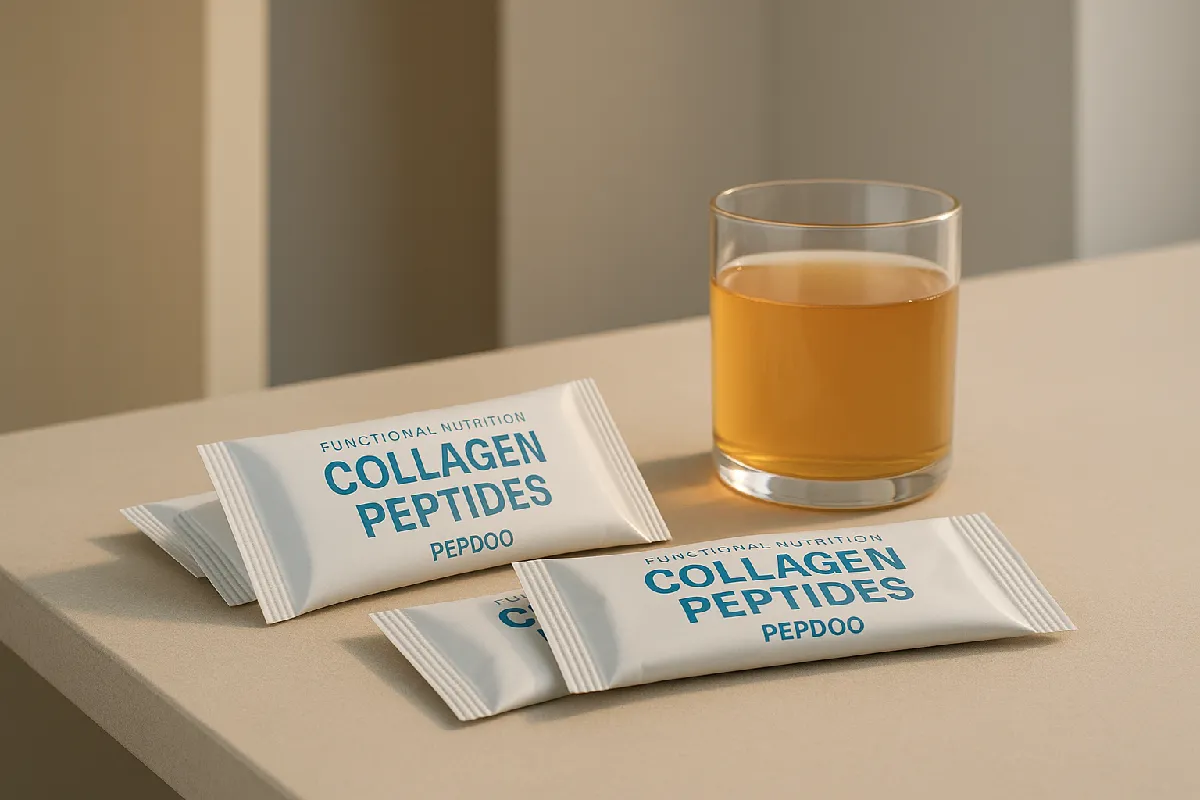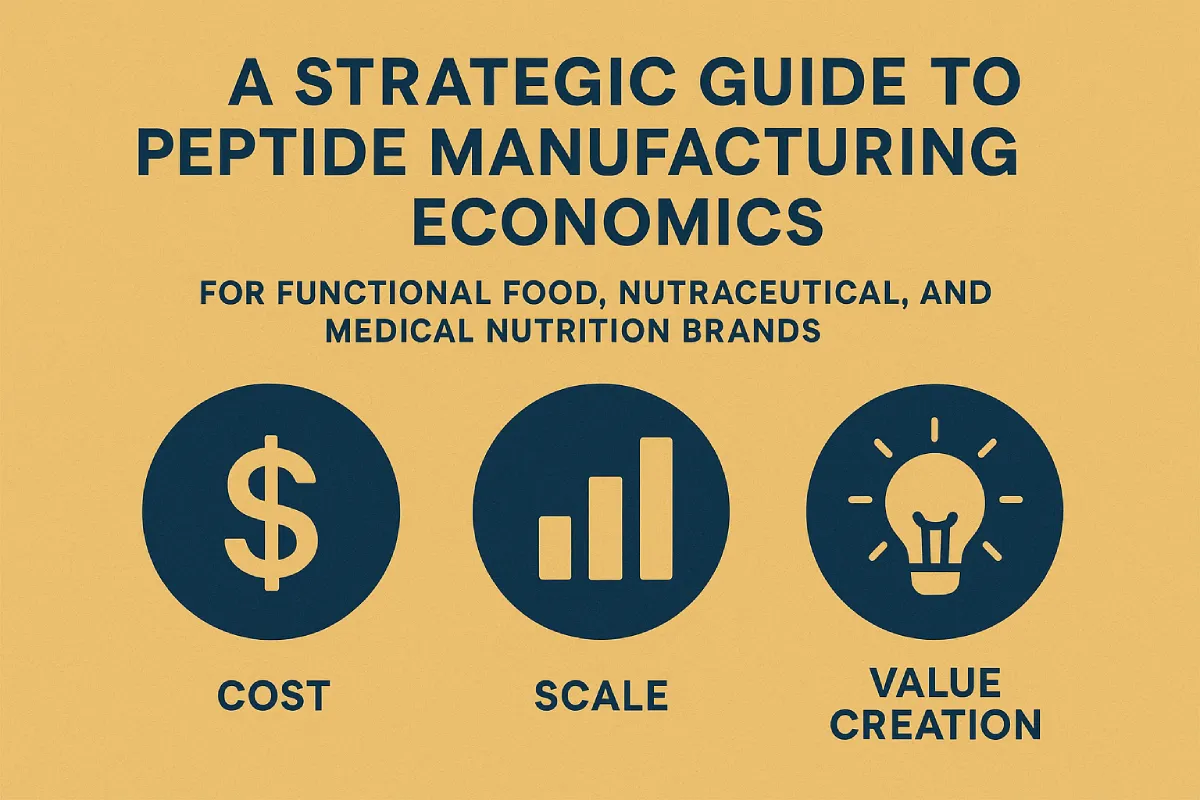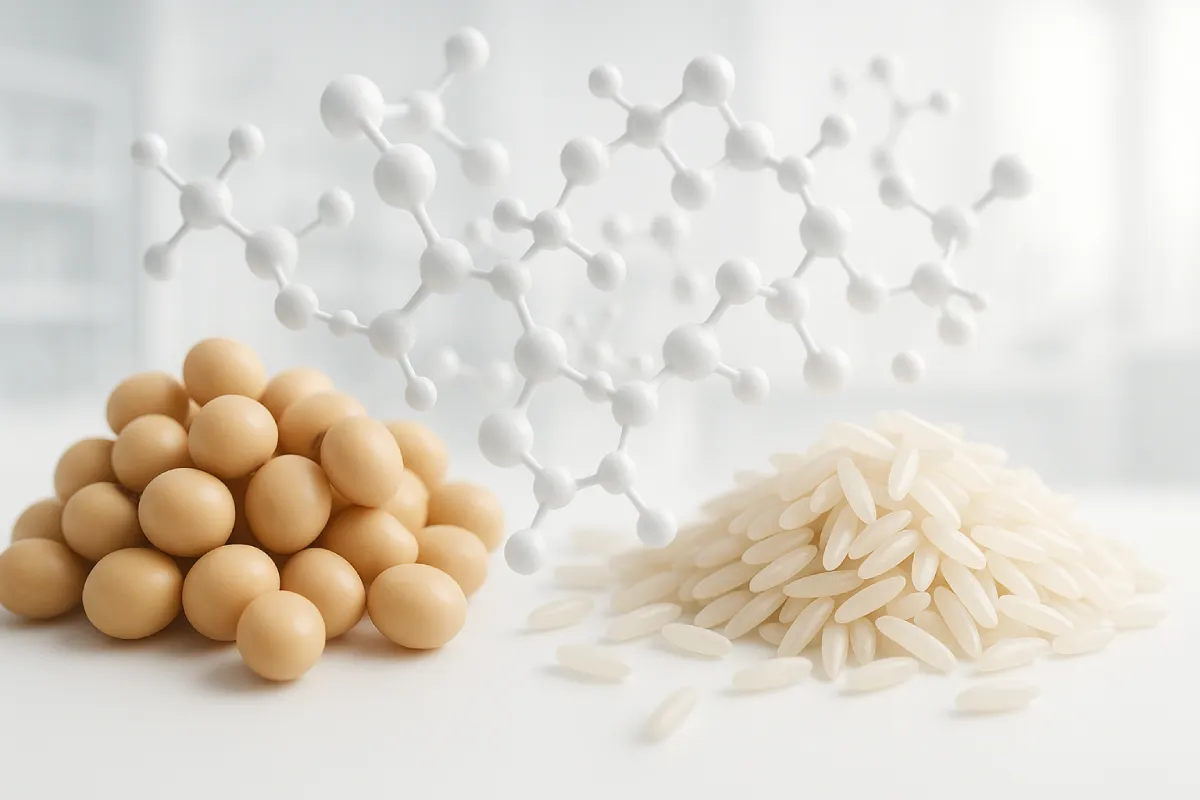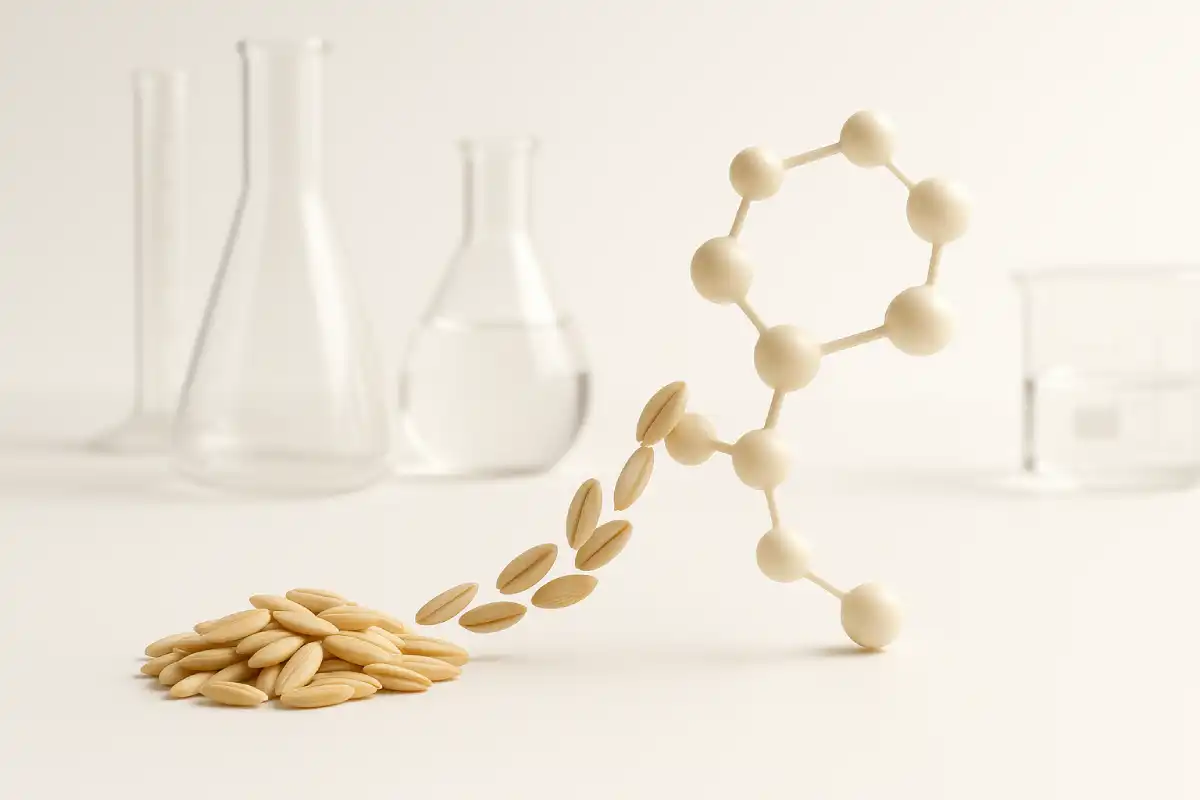Hybrid Peptides: The Emerging Frontier in Functional Nutrition
The functional nutrition market is shifting fast. B2B formulators—R&D teams, procurement leads and brand managers at functional food, nutraceutical and medical nutrition companies—are no longer satisfied with single-source ingredients that solve one problem at a time. Instead, the market is moving toward multi-functional, scientifically validated ingredients that deliver measurable benefits while meeting sustainability and clean-label expectations. Plant–marine hybrid peptides (hereafter “hybrid peptides”) sit squarely at the center of that shift. They combine the sustainability and metabolic advantages of plant-derived peptides with the high bioavailability and structural support offered by marine collagen and marine-derived peptides—yielding formulation flexibility and performance that matter to B2B customers.
PEPDOO® (an EYOSON® Group company) supports this wave as a full-category peptide manufacturer. PEPDOO® is positioned as a China-based peptide industry standard-setter and a company with a leading portfolio of small-molecule peptide patents in China, bringing together multi-stage enzymatic hydrolysis, targeted fermentation and precision fractionation to build hybrid peptide solutions for global B2B partners.
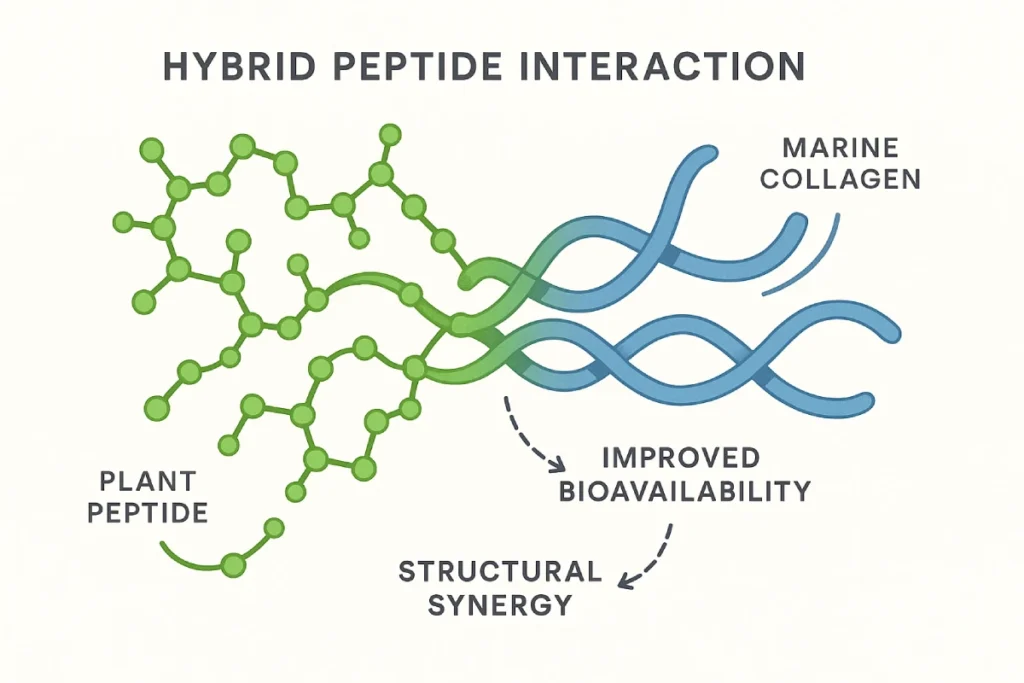
Why B2B Brands Are Turning to Plant–Marine Hybrid Peptides
B2B formulators are evaluating ingredients against three practical criteria: measurable functional effect, reliable supply/manufacture, and label positioning that meets consumer demand. Hybrid peptides answer all three:
- Functional complementarity. Plant peptides (e.g., soy, pea, rice) often supply balanced essential amino acids and bioactive sequences that modulate metabolism, antioxidant defenses and glycemic response. Marine peptides (e.g., hydrolyzed fish collagen, marine elastin peptides) supply small, collagen-rich peptides and unique amino acids (glycine, proline, hydroxyproline, specific imino acids) that are highly bioavailable for connective tissue, skin and bone support. Combining them produces a fuller amino-acid profile and the possibility of multi-target physiological effects.
- Formulation advantages. Hybrid peptides enable B2B brands to reduce ingredient count while delivering multiple claims (e.g., “supports recovery + skin elasticity + metabolic balance”). In powdered or RTD formats, careful pairing can also improve mouthfeel and solubility versus single-source analogues.
- Commercial and sustainability fit. Plant inputs reduce carbon and land-use impact; marine by-products add value through circular-economy upcycling of fisheries co-streams. Together they support clean-label and sustainability narratives increasingly required by retail and institutional buyers.
These scientific and commercial drivers are supported by expanding literature that documents both the bioactivity of plant-derived peptides and the therapeutic/premier absorption profiles of marine collagen peptides [1][2].
The Science Behind Hybrid Synergy: Mechanistic Insights
At the molecular level, synergy in hybrid peptide formulations arises from three interlocking phenomena:
- Complementary amino-acid profiles. Plant peptides tend to provide branched-chain amino acids (BCAAs) and a range of bioactive oligopeptides that signal metabolic pathways. Marine collagen peptides are rich in glycine and hydroxyproline—key substrates for endogenous collagen synthesis and connective tissue repair. The combined profile supports both metabolic signaling and structural tissue remodeling.
- Distinct but convergent signaling pathways. Plant-derived bioactive peptides often modulate redox and metabolic regulators such as AMPK and Nrf2, while marine peptides can upregulate genes related to extracellular matrix synthesis (e.g., COL1A1) and stimulate fibroblast activity. When used together, hybrid formulas can address oxidative stress, metabolic demand and structural regeneration in complementary ways—making them attractive across sports recovery, beauty-from-within and metabolic support categories [3][2].
- Manufacturing control enhances functional output. Precision enzymatic hydrolysis, multi-stage fractionation and optional post-hydrolysis fermentation enable a peptide manufacturer to tune peptide length distribution, molecular weight and peptide sequence enrichment. These manufacturing levers determine absorption kinetics, solubility and the capacity to deliver targeted bioactive peptides. PEPDOO®’s patented multi-enzyme hydrolysis and controlled fermentation technologies are engineered to deliver these targeted peptide fractions consistently at scale, which is crucial for B2B risk mitigation and regulatory consistency.
These mechanisms explain why hybrid peptide formulas—when properly designed and validated—can yield clinically relevant endpoints (skin elasticity, post-exercise recovery markers, subjective recovery and satiety) while maintaining strong supply chain credentials.
Key Application Fields for Hybrid Peptides in Functional Nutrition
Hybrid peptides are not theoretical: they are practical, flexible, and suited to multiple B2B categories.
Sports & Recovery Nutrition
Formulas that combine a plant peptide (for metabolic signaling and plant-based protein perception) with marine peptides (for rapid collagen-related tissue support) can be positioned for post-workout recovery, muscle maintenance during calorie deficit and reduced DOMS (delayed onset muscle soreness). For B2B formulators, hybrid peptides can reduce reliance on whey (allergenic, dairy) while retaining recovery performance.
Beauty-from-Within & Skin Health
Marine collagen peptides are well documented for improvements in skin hydration, elasticity and collagen density when dosed appropriately. Paired with antioxidant or anti-glycation plant peptides, hybrid formulations can target both endogenous collagen synthesis and protection from glycation/oxidative damage—two complementary levers for visible skin improvement [2][3].
Metabolic & Weight Management
Plant peptides with documented effects on satiety, glucose modulation and lipid metabolism can be combined with marine peptides that help maintain lean mass—critical for metabolic interventions and weight management products where muscle preservation determines long-term success.
Gut & Immune Health
Combining fermented plant peptides that deliver prebiotic or immunomodulatory sequences with marine peptides that provide bioavailable amino substrates can create synbiotic-style benefits in clinical nutrition and medical food segments.
Across these categories, B2B formulators gain the option to offer single-product claims (e.g., “recovery + skin support”) that resonate with both consumers and retail buyers, while simplifying supply chain management by using a single hybrid ingredient.
Case Studies: Practical, Confidential Success Stories (B2B)
Below are anonymized, validated partner case summaries illustrating how hybrid peptides have translated into commercial and formulation wins. These are real PEPDOO® client collaborations presented with confidentiality to respect client NDAs.
Case Study A — Sports Nutrition Brand (Europe)
Objective: deliver a dairy-free recovery powder for athletes that offered comparable recovery to whey-based products, while supporting a vegan-forward label story.
Approach: PEPDOO® developed a hybrid peptide concentrate combining pea-derived oligopeptides (fast-absorbing BCAAs and bioactive sequences) with hydrolyzed marine collagen fractions selected for small molecular weight and rapid absorption.
Outcome: The brand successfully launched a B2B line for athletic retailers and reported strong early repeat-purchase and practitioner acceptance due to the product’s improved mouthfeel, solubility and multi-claim positioning. Technical verification from PEPDOO®’s in-house lab confirmed favorable amino-acid profile and consistent batch MW distribution.
Case Study B — Beauty Drink (Asia)
Objective: formulate a daily beauty beverage that delivers measurable skin elasticity improvements and a clean-label story for premium retailers.
Approach: PEPDOO® supplied a hybrid blend of soybean peptide fractions (antioxidant and anti-glycation activity) with marine collagen peptides enriched for hydroxyproline. The hybrid was coupled with vitamin C for synergistic collagen synthesis.
Outcome: The brand’s clinical pilot (consumer panel) and consumer sensory testing supported their claims of “improved skin hydration and perceived firmness” and the product gained distribution in premium channels, where the combined sustainability/efficacy story resonated.
Case Study C — Medical Nutrition / Elderly Support (APAC)
Objective: create a palatable, nutrient-dense oral supplement to support older adults’ muscle mass and skin integrity.
Approach: A hybrid peptide formula combined rice-derived peptides (hypoallergenic, easy digestion) and marine collagen peptides formulated for low sodium and low allergenicity, optimized for RTD and sachet formats. PEPDOO® provided stability data and assistive documentation for regulatory filings.
Outcome: The product was accepted into institutional procurement listings due to its ease of use, stability and documented manufacturing traceability from a single supplier—reducing procurement complexity and batch QA risk.
> Note: Each case used PEPDOO®’s end-to-end technical support: raw material traceability, GMP manufacturing, tailored fractionation and stability/solubility testing—capabilities B2B customers expect from a reliable peptide manufacturer.
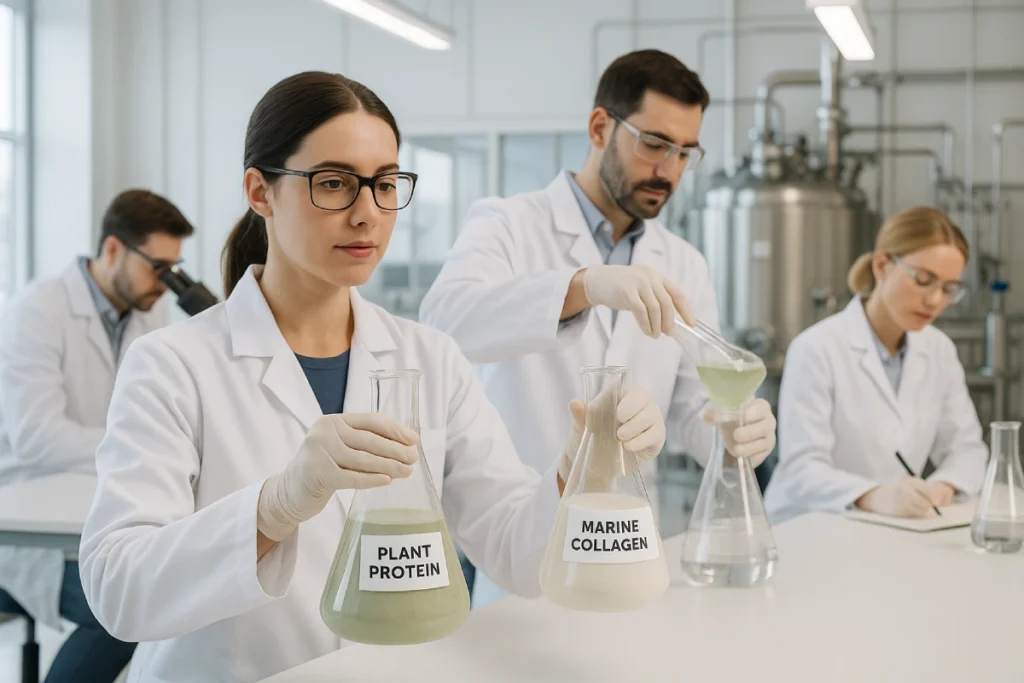
Sustainability Meets Performance: Dual-Sourced Innovation
Hybrid peptides allow formulators to craft an ingredient narrative that balances performance with sustainability:
- Upcycling marine co-streams (skins, scales, small fish) converts low-value by-products into high-value collagen peptides.
- Plant inputs can be sourced from regenerative or high-yield crops to lower carbon footprint per functional dose.
- Manufacturing footprint matters: modern peptide factories that adopt low-energy enzymatic hydrolysis and fermentation steps reduce overall process emissions.
PEPDOO®’s approach emphasizes traceable supply chains for both plant and marine inputs, green enzymatic processes and the ability to meet international quality standards—giving B2B partners the documentation and supplier reliability needed for retail, institutional and clinical markets.
How PEPDOO® Empowers B2B Partners in Hybrid Peptide Innovation
B2B customers choose manufacturers for three reasons: technical capability, regulatory and quality reliability, and co-development support.
PEPDOO® strengths for hybrid peptide projects:
- Full-category peptide manufacturing — plant, animal, marine and fermented peptide capabilities under one roof, simplifying procurement.
- Industry leadership & patents — PEPDOO® is recognized by the customer as a China-based industry standard setter with a substantial portfolio of small-molecule peptide patents; this IP enables unique fractionation and targeted functionality.
- Advanced production technology — multi-stage enzymatic hydrolysis, targeted ultrafiltration, and controlled fermentation enable precise control of molecular weight distribution and bioactive peptide enrichment.
- B2B-centric support — formulation trials, solubility and stability data, dossier support for claims and regulatory submissions, and custom OEM/ODM manufacturing at scale.
For procurement managers and R&D teams, these capabilities reduce time to market, lower formulation risk, and provide a single accountable supplier for hybrid peptide solutions.
Future Outlook: The Hybridization Era of Peptide Nutrition
The trajectory is clear: hybrid peptides are not a niche experiment but a strategy for differentiation in crowded categories. B2B brands that integrate hybrid peptide ingredients can offer multidimensional claims, better align with sustainability mandates, and differentiate on both science and sensory performance.
For R&D teams and product strategists, the practical next steps are:
1. Map desired product claims (e.g., recovery + skin elasticity).
2. Identify the plant and marine peptide types that best support those claims.
3. Partner with a full-category manufacturer that can deliver reproducible peptide fractions, regulatory documentation and scale.
PEPDOO® is positioned to be that partner—offering hybrid peptide solutions that combine China’s patent-backed process innovations with global quality practices.
Co-Develop Next-Generation Hybrid Peptide Solutions with PEPDOO®
Partner with China’s leading full-category peptide manufacturer and patent innovator. Leverage PEPDOO®’s industry-standard processes, multi-stage enzymatic hydrolysis, and custom hybrid peptide formulations to accelerate your functional nutrition product development—sports, beauty, metabolic or medical nutrition.
Schedule a Technical Consultation →FAQ
Plant–Marine Hybrid Peptides are functional ingredients combining plant-derived bioactive peptides (e.g., soy, pea, rice) with marine-sourced collagen or elastin peptides. This dual-source composition delivers both metabolic and structural benefits—making them ideal for multi-claim formulations in functional foods, supplements, and medical nutrition products.
Hybrid peptides provide enhanced amino-acid balance, superior absorption, and broader physiological benefits compared to single-source peptides. For manufacturers, they enable cleaner labels, reduced ingredient counts, and sustainability claims—valuable in competitive markets like sports recovery, beauty-from-within, and metabolic health.
Yes. PEPDOO® offers full customization—controlling enzymatic hydrolysis stages, molecular weight distribution, and bioactive peptide enrichment. We tailor peptide profiles based on target functions (e.g., anti-fatigue, skin elasticity, satiety, or glycemic control) and dosage forms (powder, RTD, capsule, etc.).
PEPDOO® operates under GMP and ISO standards, providing full traceability, batch documentation, and analytical certificates. Our hybrid peptide ingredients meet requirements for functional food, dietary supplement, and medical nutrition applications across APAC, EU, and North America. We also assist partners with registration dossiers and stability data packages.
PEPDOO® is China’s full-category peptide manufacturer, industry standard-setter, and one of the top holders of small-molecule peptide patents. We combine China’s leading, internationally advanced peptide production technologies with extensive OEM/ODM experience—offering reliable scale-up, consistent quality, and co-development support for global partners.
Hybrid peptides are ideal for functional foods, sports recovery products, beauty-from-within supplements, and clinical/elderly nutrition formulas. They meet the technical and narrative needs of R&D-driven brands seeking differentiated functional performance with sustainability credentials.
Contact our formulation team to discuss target health claims, dosage forms, and regulatory goals. We provide technical consultations, sample programs, and co-development frameworks for new product pipelines. Contact PEPDOO® →
References
- Bauer, M., Glowacka, M., Kamysz, W., & Kleczkowska, P. (2024). Marine peptides: Potential basic structures for the development of hybrid compounds as multitarget therapeutics for the treatment of multifactorial diseases. International Journal of Molecular Sciences, 25(23), 12601.
- Purohit, K., et al. (2024). Exploring the potential of bioactive peptides: From natural sources to functional applications. Frontiers and Reviews in Peptide Science. (See review for mechanisms and manufacturing considerations).
- Mani, S., et al. (2022). The updated review on plant peptides and their therapeutic activities. Journal of Plant-Derived Bioactives, 2022. (Comprehensive review of plant-derived peptide bioactivities).


